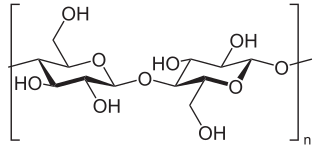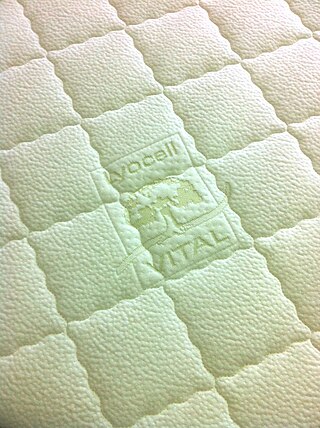
Cellulose is an organic compound with the formula (C
6H
10O
5)
n, a polysaccharide consisting of a linear chain of several hundred to many thousands of β(1→4) linked D-glucose units. Cellulose is an important structural component of the primary cell wall of green plants, many forms of algae and the oomycetes. Some species of bacteria secrete it to form biofilms. Cellulose is the most abundant organic polymer on Earth. The cellulose content of cotton fiber is 90%, that of wood is 40–50%, and that of dried hemp is approximately 57%.

Papermaking is the manufacture of paper and cardboard, which are used widely for printing, writing, and packaging, among many other purposes. Today almost all paper is made using industrial machinery, while handmade paper survives as a specialized craft and a medium for artistic expression.

Rayon, also called viscose and commercialised in some countries as sabra silk or cactus silk, is a semi-synthetic fiber, made from natural sources of regenerated cellulose, such as wood and related agricultural products. It has the same molecular structure as cellulose. Many types and grades of viscose fibers and films exist. Some imitate the feel and texture of natural fibers such as silk, wool, cotton, and linen. The types that resemble silk are often called artificial silk. It is used to make textiles for clothing and other purposes.

Pulp is a lignocellulosic fibrous material prepared by chemically or mechanically separating cellulose fibers from wood, fiber crops, waste paper, or rags. Mixed with water and other chemical or plant-based additives, pulp is the major raw material used in papermaking and the industrial production of other paper products.
Synthetic fibers or synthetic fibres are fibers made by humans through chemical synthesis, as opposed to natural fibers that are directly derived from living organisms, such as plants or fur from animals. They are the result of extensive research by scientists to replicate naturally occurring animal and plant fibers. In general, synthetic fibers are created by extruding fiber-forming materials through spinnerets, forming a fiber. These are called synthetic or artificial fibers. The word polymer comes from a Greek prefix "poly" which means "many" and suffix "mer" which means "single units"..

Lyocell is a semi-synthetic fiber used to make textiles for clothing and other purposes. It is a form of regenerated cellulose made by dissolving pulp and dry jet-wet spinning. Unlike rayon made by some of the more common viscose processes, Lyocell production does not use carbon disulfide, which is toxic to workers and the environment. Lyocell was originally trademarked as Tencel in 1982.

Fiber crops are field crops grown for their fibers, which are traditionally used to make paper, cloth, or rope.

The Lenzing Group is an international group with its headquarters in Lenzing, Austria, and production sites in all major markets. Lenzing produces wood-based viscose fibers, modal fibers, lyocell fibers and filament yarn, which are used in the textile industry — in clothing, home textiles and technical textiles — as well as in the nonwovens industry. In addition, the company is active in mechanical and plant engineering. The Lenzing Group markets its products under the brand names TENCEL, VEOCEL, LENZING ECOVERO and LENZING.
Courtaulds was a United Kingdom-based manufacturer of fabric, clothing, artificial fibres, and chemicals. It was established in 1794 and became the world's leading man-made fibre production company before being broken up in 1990 into Courtaulds plc and Courtaulds Textiles Ltd.

Grasim Industries Limited is an Indian manufacturing company based in Mumbai. Since its inception in 1947 as a textile manufacturer, Grasim has diversified into textile raw materials like viscose staple fiber (VSF) and viscose filament yarn, chemicals and insulators, along with cement and financial services through its subsidiaries UltraTech Cement and Aditya Birla Capital respectively. The company is a part of the Aditya Birla Group.
Sukanto Tanoto is an Indonesian businessman primarily involved in resources-based manufacturing. After starting as a supplier of equipment and materials for the state-owned oil firm Pertamina, Tanoto moved into the forest industry in 1973. Tanoto's business interests are represented by the Royal Golden Eagle (RGE) group of companies, previously known as Raja Garuda Mas.

Bamboo textile is any cloth, yarn or clothing made from bamboo fibres. While historically used only for structural elements, such as bustles and the ribs of corsets, in recent years different technologies have been developed that allow bamboo fibre to be used for a wide range of textile and fashion applications.

Cellulose fibers are fibers made with ethers or esters of cellulose, which can be obtained from the bark, wood or leaves of plants, or from other plant-based material. In addition to cellulose, the fibers may also contain hemicellulose and lignin, with different percentages of these components altering the mechanical properties of the fibers.
Royal Golden Eagle is a global integrated, resource-based industrial group, with businesses in paper, palm oil, viscose, construction and energy, property and asset management. Owned by Indonesian businessman Sukanto Tanoto, the group employs 60,000 people worldwide with assets exceeding US$30 billion.

Cotton recycling is the process of converting cotton fabric into fibers that can be reused into other textile products.
Hydroentanglement is a bonding process for wet or dry fibrous webs made by either carding, airlaying or wet-laying, the resulting bonded fabric being a nonwoven. It uses fine, high pressure jets of water which penetrate the web, hit the conveyor belt and bounce back causing the fibres to entangle.

Anderson Tanoto is a member of the board of trustees at Tanoto Foundation, a philanthropic organization involved in poverty alleviation through education, "empowerment" and "the enhancement of the quality of lives". Tanoto is the youngest son of businessman and philanthropist Sukanto Tanoto. He received his education from University of Pennsylvania's Wharton School, where he graduated with a Bachelor of Science in economics. In October 2017, he was named to The Wharton School's "40 Under 40" list, which seeks to recognise impressive young Wharton alumni. Tanoto also sits on the Wharton Executive Board of Asia.

The Hong Kong Research Institute of Textiles and Apparel (HKRITA) is a public research institute in Hong Kong. It was established in April 2006 and hosted by The Hong Kong Polytechnic University (PolyU). With funding support from the Innovation and Technology Commission, HKSAR Government, it acts as a focal point to enhance technological innovation in textiles and apparel industry for the development of highly competitive industrial clusters in Hong Kong and the Greater Bay Area.
Red Scar Works was built in 1939 by Courtaulds and produced rayon. It was located in Ribbleton Preston off Longridge Road. The closure of the works was announced in November 1979 and the issue raised in the UK Parliament House of Commons by the constituency MP. At the time of closure approximately 2,600 people were employed there but there were approximately 4,000 at its peak. It was the largest rayon producing site in Britain. Two main products were manufactured with one being tyre cord by a process known as CSPT – Continuous Spinning Process Tenasco. Two main denier of this product were manufactured. The other product was a general textile called Bright. A range of deniers of this were produced in a range of colours. The trade name for the coloured product was Duracol. At the time of closure, one reason given by management for the closure was the rising popularity of steel belt radial tires thus reducing demand for tyre cord.
Asia Pacific Rayon (APR) is one of the largest viscose-rayon producers in Asia, with annual capacity of 300,000 tons of viscose-rayon. The company is based in Pangkalan Kerinci, Riau, Indonesia. The company produces renewable and biodegradable viscose-rayon, which is made from wood cellulose, and serves as an alternative to fossil-based synthetics in the textile industry. It is one of Royal Golden Eagle's business groups.











